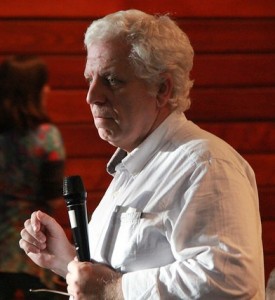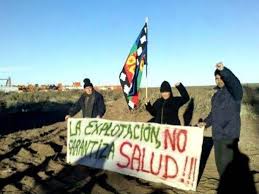Eduardo Gudynas accuses some of David Harvey’s Latin American followers of ‘friendly colonialism’. Harvey´s research team CENEDET in Ecuador replies, and Joan Martínez Alier comments
1. Friendly colonialism and the ‘Harvey fashion’
By Eduardo Gudynas*

Eduardo Gudynas during the encounter «Democracies in Dispute», realized by Rosa Luxemburg Foundation in Bogotá, September 2015. Foto: Gerhard Dilger
One of the most striking issues in the critiques of capitalism coming from Latin America are the continuous invocations of the English geographer David Harvey. References to the idea of “accumulation by dispossession” are repeated in hundreds of academic texts published by Latin Americans, and the author himself has been invited by the progressive governments of Ecuador and Bolivia.
Let us recall that Harvey proposed the idea of ” to replace Karl Marx’s concept of “original (or primitive) accumulation”. It refers to processes such as the commodification of land, expulsion of peasants, the transformation of labour into a commodity, colonialism or other aspects of the financialisation of economies.
They are attractive ideas which, without elaborating, many would share, and which in part explains the avalanche in citations of the term. Beyond that, however, I would like to explore other aspects of this “Harvey fashion” especially in South America, and the fact that the progressive governments of invite him and use his concepts to enhance their image as radicals. I am concerned about two issues.
The first is that this “fashion” ignores the rich history of Latin American reflections and takes us back into the hands of Northern thought. The second is that, while critiques such as Harvey’s can be shared, they are in any case insufficient for the Latin American reality. And it is precisely because of their incompleteness that progressive governments cite him and invite him.
A fashion
Let me explain, starting with the first point. The problem of accumulation by dispossession popularized by Harvey, as capitalist appropriation of natural resources or labour, in its basic ideas is not new. In Latin America we have a long and sad history of massive appropriation of our resources and of dispossession of indigenous people and peasants to enrich corporations and governments in other continents.
We also have many thinkers, activists and academics who, in their own way, in the last century at least have essentially supported these ideas. To give a few examples that come to mind, the reflections proposed decades ago by Mario Arrubla in Colombia, René Zavaleta Mercado in Bolivia, Ruy Mauro Marini from Brazil and Fernando Velasco Abad from Ecuador. Regardless of the positions one may have today regarding these and other authors, my point is that there is a very rich library of Latin Americans which is neglected time and again.
All this leads me to point out that, irrespective of whether one agrees or not with specific aspects of the theory of accumulation by dispossession, it would seem at times that this fashion is a new symptom of intellectual colonialism, whereby many prefer to quote an English author, leaving aside the recovery of our Latin American intellectual references. This may have to do with the academic obsession embraced in Latin America to cite texts in English or publications in Northern journals, as a demonstration of scientific expertise.
We are not facing a problem with Harvey, but rather a limitation in us Latin Americans. It is a friendly colonialism. It is friendly because the idea of a critique of global capitalism is attractive, but what goes unnoticed for this reason is that this is a form of colonialism, since we all draw upon, copy, repeat or seek the legitimation which irradiates from the “North”.
Four shortcomings
My second point does have to do with the emphasis of Harvey’s analysis. I insist that many of his theses can be shared, as they offer a valuable tool for understanding global capitalism. But the key issue to consider is whether these contributions are sufficient to understand what happens in Latin America, in our continent, and at this exact moment, at the beginning of the twenty-first century. Here I find four important limitations.
The first one is that the approaches of the British geographer are primarily at a high level of abstraction, very focused on the dynamics of planetary capitalism. There are local and national examples, but there is no in-depth analysis of the forms of capitalist organisation typical of Latin America. His studies are so abstract that they allow a radical critique of capitalism as a global phenomenon but do not require analysing the details of national or Latin American contexts. This is not a minor limitation, since Latin America is inserted into globalization primarily through its extractive exports, and that kind of specificity does not appear clearly in Harvey. The geographer’s emphasis is on much larger scales. Couldn’t this be one of the reasons why he is cited and invited by progressive governments?
Because many progressives do just that, they challenge international capitalism but without taking on the contradictions internal to capitalism itself, or they attack imperialism but are almost silent on the internal colonialism they impose on peasants and indigenous peoples. Harvey’s texts fit perfectly with this duality, allowing global critiques (with the symbolic advantages of his Marxist language), without requiring much on national predicaments. This is a duality that has not gone unnoticed at conferences by the geographer in Quito or La Paz.
A second problem is the limited attention that Harvey pays to the ecological dimension. There is a no local Nature, rooted in territories, but rather an abstract consideration of the environment. This is not surprising because this author has had many problems in considering the environmental dimension (for instance, he distrusts ecological limits to economic growth). But if we want to carry out a Latin American critique of capitalism, we must necessarily incorporate an ecological dimension, involving the role of natural resources as well as concepts such as Pachamama, ayllu or life-territories. The distinctive ecological features of our region are not found anywhere else. In addition, its principal developmentalist strategies rest on a massive extraction of natural resources, and therefore any analysis will be incomplete if these aspects are not considered.
Again I wonder if this limitation is not one of the reasons why progressive governments endorse Harvey, since it offers the possibility of radical discourse against capitalism but without addressing local ecological destruction, territorialized in each country. It is a very attractive theoretical crutch for a government that wants to criticise, for example, the transnational nature of corporations, without saying anything about their role in generating negative social and environmental impacts associated with resource extraction in their own countries. (As a warning to the reader, it must be recognised that in one of his visits to Quito, Harvey symbolically signed a petition by Yasunidos to request a public consultation for oil exploitation in the area of Yasuni, in the Ecuadorian Amazon).
A third point concerns the fact that Harvey pays little to no attention to the indigenous world. His discourse is committed to popular sectors, such as in cities in the northern hemisphere, but the knowledge and visions of indigenous people are almost nonexistent. It is a viewpoint informed by western and modern knowledge. I cannot find a place for the Ecuadorian sumak kawsay or the Bolivian suma qamaña in Harvey’s texts. A key reason is that the ways of understanding the concept of value are very different in this author and in the framework of Buen Vivir. Once again this offers a good reason for progressive governments’ invitations, because his ideas allow for a critique of capitalism while avoiding indigenous demands. International financialization and power asymmetries in relation to capital can be treated at length without having to consider indigenous voices. This is also an untenable position for the Latin American context.

Indigenous people protesting in front of the Palacio do Planalto, in Brasília. Foto: Ruy Sposati/Xingu Vivo
My last point is that alternatives to capitalism are given very limited space in Harvey. He seems to fall into pessimism, in suggesting that the only solution would be to move from exchange value to use value. This is very similar to the discourse of various rulers who say, for example, that they must remain extractivist because there are no alternatives to global capitalism. It is quite understandable that Harvey would find in Latin American progressive governments a step towards the alternatives he seems to hope for, given that they certainly have positive aspects compared to the conservatism of the governments he has known for decades in Europe and the United States. But that’s not enough for Latin America, since we now have different references for comparison. Here again I cannot help to note the convenience for rulers to cite Harvey, since the alternatives he proposes are so abstract and distant in time that they can be embraced while continuing to negotiate with contemporary capitalism.
Nor should it be forgotten that in the continent there are civic organisations and reflections which explore much more substantial alternatives, not concerned exclusively with use value. The clearest example is the rights of Nature in Ecuador’s Constitution, which start from a recognition of Nature as a subject, and therefore with its own values. Here there is a huge theoretical gap in Harvey’s gaze, which many pretend not to see. For in Harvey’s classical Marxism there is value only in humans and their work, and therefore there is no room for the rights of Nature.
Recover our own thinking
As it can be seen from this brief review, the work of Harvey is good to discuss global capitalism, but it does not require addressing social, environmental or economic impacts within each country, or a dialogue with indigenous knowledge. It is very useful to understand the workings of Wall Street, but it misses what happens in our Amazon. Is comfortable for academics and progressive governments to quote Harvey (and something analogous happens with Toni Negri), as it allows them to adopt anti-capitalist discourses while skipping prickly issues such as the contradictions of the capital within the country. It is a type of analysis which allows them to avoid almost all thorny issues regarding their development strategies.
As I said above, this is not a problem with these authors; rather, we face limitations and contradictions in the creation of a thought that is specifically Latin American. We, Latin Americans, must carry this discussion forward, and not wait for Harvey, Negri or others to stimulate it. This does not mean they should be ignored, since in their writings there are many worthy and useful lessons which can contribute to our own debate. But this task should essentially be in our hands.
The problem with the abuse of the “Harvey fashion” is that such theoretical positions are friendly, and thus it is difficult for us to recognise their limitations. It is a weakness which is exploited precisely by those who want to silence debates about national contradictions or those who abuse academic power in order to limit reflections. This trend also reinforces a colonialism which searches in the “academic north” legitimisation and truths. In this way we hold onto a colonialism that hinders our own thinking and the possibility of exploring substantive alternatives.
To break this colonial fence, a critical look from a Latin American standpoint must always be anchored in national and local circumstances (it must be grounded), it must pay attention to the environmental implications (it must be ecological), it must necessarily incorporate and dialogue with indigenous peoples (it must be intercultural), and it must illuminate ideas and practices around alternatives to development (it must break the fence of Modernity).
*Eduardo Gudynas is a reseacher of the Latin American Centre for Social Ecology (CLAES), Montevideo. Twitter: @EGudynas. Translation by Diego Andreucci and Melissa García Lamarca, Entitle blog
2. Neither colonialist/colonized nor nice
A response to Eduardo Gudynas
By Estefanía Martínez, Verónica Morales, Carla Simbaña, Japhy Wilson, Nora Fernández, Thomas Purcell y Jeremy Rayner (CENEDET)
In an article recently published on various critical political websites, Eduardo Gudynas accuses David Harvey of “a nice colonialism”. According to Gudynas, the presence of Harvey in Latin America, and the “trendiness” of his Marxist theoretical framework, are providing ideological support for certain governments in the region. As an example, Gudynas refers to CENEDET, the research team led by Harvey in Ecuador. In this article we respond by emphasizing the utility of Harvey’s work for critical thinking and anti-capitalist struggles in Latin America, in contrast to Gudynas’s superficial analyses of “extractivism.”
One of the most important aspects of Harvey’s thought is the concept of accumulation by dispossession, which has been extremely useful for social movements that condemn and resist the dispossession and displacement that have been forced on peoples throughout Latin America. We therefore find it disturbing that this concept should provide the focus for Gudynas’s critique of Harvey’s work.
Perhaps Gudynas senses that he is no longer as ‘trendy’ as he once was, and has chosen to respond by attacking a theory that better serves resistance movements opposed to so-called “extractivism”? In his article he argues that some Latin American governments critique “global capitalism” as a convenient means of concealing the reproduction of capitalist social relations within their national territories. But his own critique of Harvey as a supposedly “kind colonialist” reproduces the same tendency in the field of academic thought, blaming external forces for avoiding internal changes, and rejecting a powerful theory because of its origin in the “North”, in order to hide the weaknesses of his own theoretical framework.
Rather than speculating further upon his motives, it is necessary to clarify some basic errors in Gudynas’s presentation of the theory of accumulation by dispossession. Gudynas refers to this theory as a simple reproduction of Marx’s theory of primitive accumulation – of the separation of the peasantry from the land that forms the basis of capitalist social relations. Harvey certainly takes inspiration from Marx in this regard, but his argument is that these processes of dispossession are much more widespread than Marx indicated, and that they cannot be relegated to the past but continue to be active in contemporary capitalism.
According to Harvey, there is a dialectical relation (a concept that Gudynas is apparently unable to grasp) between the expanded reproduction of capital though the production and accumulation of surplus value in the exploitation of labor power – and accumulation by dispossession based on the outright theft of use values and their transformation into exchange values through the process of commodification .
In the context of capitalist crises (dynamics that Gudynas is equally incapable of comprehending), in which expanded reproduction slows and economic growth becomes negative, accumulation by dispossession assumes increasing importance for capital. According to Harvey, the intensification of accumulation by dispossession in the era of neoliberalism is an expression of the crisis of expanded reproduction at a global level, underway since the 1970s.
For Gudynas this focus on the global level is a profound weakness that makes Harvey irrelevant to the analysis of the concrete realities of Latin America. It seems that Gudynas does not understand the importance of examining the relation between geographical scales, which is fundamental to the critique of a capitalist system that operates simultaneously on the local and global levels. It is precisely here that the utility of the concept of accumulation by dispossession lies – it allows us, for example, to connect the violent dispossession of an indigenous community in the Ecuadorian Amazon with the over-accumulation of capital in China, instead of merely denouncing the event in abstract terms as a consequence of “extractivism”.
It turns out that descriptive and one-dimensional concepts such as “extractivism” and “neo-extractivism” are less useful than Marxian dialectics for critical thought and political action. It is for this reason, and not because of an alleged “mental colonialism”, that Latin American intellectuals and social movements are using Harvey’s concepts in place of Gudynas’s ideas.
In this respect, it is important to note that Gudynas’s own concept of extractivism is based on theories of “the Dutch disease” and “the resource curse”. These theories not only come from “the North” but are also derived from neoclassical economics; that is to say, from bourgeois thought. This is a far greater problem than a particular geographical origin when referring to a concept that has pretensions to being a useful tool in subaltern struggles.
Gudynas presents accumulation by dispossession as if it were the only thing that has crossed Harvey’s mind in his entire life. (…)
Go on reading here.
3. Gudynas and Harvey
The year 2015 is a year of intellectual triumph for post-extractivism, and Harvey’s apprentices haven’t realised it.
 The initial article where Gudynas criticised the concept of “accumulation by dispossession” was, I think, quite short and with limited analysis. It is known that Gudynas does not come from a Marxist tradition. There is much more to say about the current application of the “primitive” or “original” accumulation” concept, as Rosa Luxemburg has already pointed to, and Harvey’s contribution is without doubt an interesting and influential one. In my opinion, this is not sufficiently analysed by Gudynas.The dependence of metropoles on imports from the peripheries was never as great as it is now. The extraction of materials and the export of materials from South America, for example, grew more then four times from 1970 until 2008. It is obvious that such a rhythm of plundering nature and abusing local populations in extractive borders should not and surely cannot be sustained in the following decades. Gudynas’ critique is a simplification, but Harvey has not yet bothered to reply. (…)
The initial article where Gudynas criticised the concept of “accumulation by dispossession” was, I think, quite short and with limited analysis. It is known that Gudynas does not come from a Marxist tradition. There is much more to say about the current application of the “primitive” or “original” accumulation” concept, as Rosa Luxemburg has already pointed to, and Harvey’s contribution is without doubt an interesting and influential one. In my opinion, this is not sufficiently analysed by Gudynas.The dependence of metropoles on imports from the peripheries was never as great as it is now. The extraction of materials and the export of materials from South America, for example, grew more then four times from 1970 until 2008. It is obvious that such a rhythm of plundering nature and abusing local populations in extractive borders should not and surely cannot be sustained in the following decades. Gudynas’ critique is a simplification, but Harvey has not yet bothered to reply. (…)Go on reading here.
The debate in Spanish.



